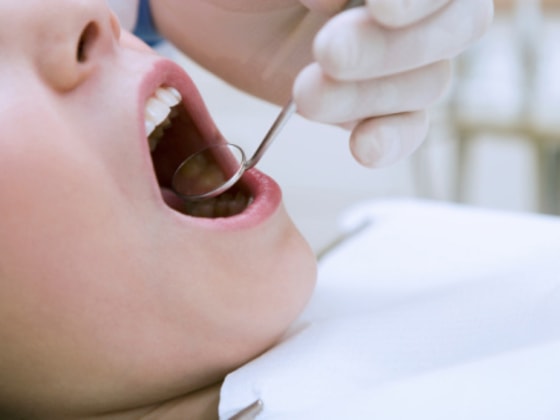Could wisdom teeth be a problem of the past? Researchers have found that young children who got shots of anesthetic for dental work sometimes never grow lower wisdom teeth when they are older.
The findings, published in The Journal of the American Dental Association, suggest it might be possible to deliberately prevent the development of the often-troublesome teeth, the team at Tufts University School of Dental Medicine said.
“It is intriguing to think that something as routine as local anesthesia could stop wisdom teeth from developing,” says Dr. Anthony Silvestri, who oversaw the study.
The team just looked at children being treated at Tufts, and they only have a few hundred records, so the findings would have to be repeated in a larger group of children to be sure. But they suggest it might be possible to apply an already widely used medication to prevent the development of a common tooth problem.
As many as 5 million Americans get their wisdom teeth pulled every year. Medically known as third molars, these very back teeth usually emerge in the late teens or early 20s and they can sometimes cause trouble, pushing against other teeth. They are also difficult to clean and can become decayed.
Some dental experts advocate removing them even before trouble shows, just to prevent pain down the road. “In the late teens the roots of the third molars haven’t fully developed yet and they are easiest to extract,” Silvestri said in a telephone interview. The Cochrane Group, which reviews medical evidence, issued a report in 2006 and updated in 2012 saying there's no strong evidence to either support or attack the approach.
Silvestri had been studying other possibilities -- perhaps even preventing the development of third molars in the first place.
"All the permanent teeth have already started to form by birth. But the wisdom tooth doesn’t exist from birth,” he says. There’s just a little “bud” of cells. At age 4 or so, he says, there’s a bud just about the size of the diameter of the needle used to deliver anesthesia.
He’s been testing a laser in rats, using a little pulse on the gum, just to warm it, and prevent the development of third molars (yes, rats have them, too).
One of his students, Jerry Swee, came up with another idea. He wondered if injecting anesthesia somehow prevented development of wisdom teeth.
“He pretty much took it upon himself to just check and see if there was any correlation,” Silvestri says.
Swee, now an instructor at the school, enlisted his former professor. They checked the records of young patients at the Tufts pediatric dental clinic who also had a dental x-ray taken three or more years after initial treatment in the clinic. They analyzed 439 sites where wisdom teeth could develop in the lower jaw, from 220 patients originally treated between the ages of 2 and 6. Of them 63 had been given an injection of lidocaine or other anesthesia.
The x-rays will show the wisdom tooth buds, and nearly 8 percent of the children who had received injections lacked evidence of wisdom tooth buds. That compared to about two percent of children who did not get shots.
“The incidence of missing wisdom teeth was significantly higher in the group that had received dental anesthesia; statistical evidence suggests that this did not happen by chance alone,” the researchers wrote.
“We were surpised by the results,” Silvestri said.
So what happened?
“Trauma from the needle inadvertently hitting the little tooth bud is one of the possibilities,” he says. “The needle for this particular type of injection is very close to where that tooth bud forms. It is also possible that maybe it could be the anesthetic solution itself.’
Silvestri stresses that much more research is needed, including wider studies that show whether children who get anesthesia at a young age are less likely to develop wisdom teeth in the areas treated, and also to see if there are any bad consequences as a result.
But he sees mostly an upside to preventing the development of wisdom teeth, which some dentists consider unnecessary. “Nature does it all the time,” Silvestri says.
“Up to 20 percent of the time, people don’t develop one or two or three or four wisdom teeth and they don’t have any complications,” he said.
And having wisdom teeth removed can not only be uncomfortable or even painful, it can cause complications, including, very rarely, death.
Not everyone agrees it's a good idea, either. Los Angeles dental consultant and health care activist Jay Friedman wrote a 2007 paper for the American Public Health Association attacking the practice of removing wisdom teeth before trouble starts. "There is no evidence of widespread third-molar infection and pathology or of medical necessity to justify so much surgery," Friedman wrote.
"In fact, 50 percent of upper third molars classified as impactions are normally developing teeth, most of which will erupt with minimal discomfort if not extracted prematurely. Only 12 percent of truly impacted teeth are associated with pathological conditions such as cysts and damage to adjacent teeth," he wrote.
But Friedman is also cautious about the idea of trying to prevent the development of wisdom teeth. "I think the Tufts observations are interesting, but they suggest a hit or miss approach to eliminating wisdom teeth, as well as probably being impractical on a universal or population scale," he said by e-mail.
"For a controlled study to see if the technique really worked, children around 4 years of age would have to have the solution injected into the area of development, which is not the same as the area to achieve local anesthesia. I don't know if such a study would pass muster."
Related:
